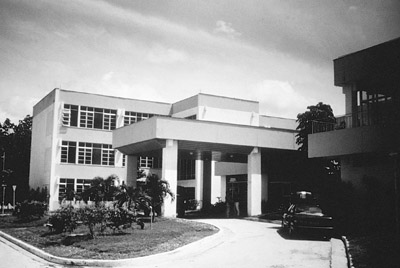


La culture de tissus permet de produire des plantes génétiquement stables et résistantes sur le plan physiologique. Il s'agit en outre d'une méthode simple de propagation des végétaux. Toutefois, elle exige beaucoup de main-d'oeuvre et les coûts salariaux représentent 60 pour cent des coûts de production. L'Institut de biotechnologie des plantes de l'Université centrale de Las Villas (Cuba) a conçu une méthode économique utilisant l'énergie solaire pour produire des plantes en laboratoire. Dans le cadre du Programme pour l'utilisation d'experts en CTPD/CTPT M. Juan Pérez Ponce, un expert en culture de tissus à l'Institut cubain, s'est rendu en mission dans l'île antillaise de la Grenade pour aider ce pays à prévoir la mise en place d'un nouveau centre de biotechnologie.
La Grenade possède un climat semblable au climat de Cuba. Au cours de sa mission, M. Pérez Ponce s'est rendu sur différents sites pour déterminer s'ils se prêtaient à l'installation d'un nouveau centre de biotechnologie. Main-d'oeuvre exceptée, les principales dépenses liées à l'installation d'un nouveau centre sont la construction proprement dite et l'électricité requise pour éclairer les locaux et maintenir une température ambiante adéquate dans les pièces. La nouvelle installation utilisera des technologies de haut niveau et une élite professionnelle qui lui permettront d'assurer une propagation à grande échelle. Au départ, elle devrait produire un million de végétaux par an en utilisant la technique de la culture de tissus.
El cultivo de tejidos produce plantas que son genéticamente estables y fisiológicamente robustas. Ahora bien, aunque se trata de un método relativamente sencillo de propagación vegetal, es un gran coeficiente de trabajo: la mano de obra constituye un 60 por ciento de los gastos de producción. El Instituto de Biotecnología Vegetal de la Universidad Central de Las Villas, Cuba ha desarrollado un método a base de energía solar que resulta económico para producir plantas en el laboratorio. Al amparo del Programa de expertos CTPD/CTPT, un experto en cultivo de tejidos procedente del Instituto, el Dr. Juan Pérez Ponce, llevó a cabo una misión en la isla caribeña de Granada para ayudar a este país a levantar una nueva planta de biotecnología.
Granada posee un clima análogo al de Cuba y durante su misión el Dr. Pérez Ponce visitó varios lugares en Granada a fin de analizar su idoneidad para la instalación de un nuevo centro de biotecnología en la isla. Además de los costos en mano de obra y personal, los gastos más importantes en el establecimiento de una nueva instalación comprenden la construcción y la electricidad para iluminar y mantener la temperatura correcta dentro de sus cámaras. La nueva instalación de biotecnología utilizará altos niveles de tecnología y personal muy capacitado para lograr una propagación en gran escala. Se comenzará produciendo un millón de plantas al año recurriendo a la técnica del cultivo de tejidos.
![]()
Over the past two decades, the development of tissue culture - the growth of in vitro plants in the laboratory from pieces of plant tissue - has produced an alternative solution to one of the principal problems arising in agriculture: growing crops that are free from pests and diseases, especially those cultivated through vegetative propagation. To date, more than 50 000 varieties from a large number of different species are now disease-cleaned and distributed worldwide. Tissue culture produces plants that are genetically stable and physiologically strong. But, while it is a relatively simple method of plant propagation, it is labour-intensive: labour accounts for 60 percent of production costs. The Institute for Plant Biotechnology of the Central University of Las Villas in Cuba has developed a cost-effective solar energy method for producing plants in the laboratory.
Under the TCDC/TCCT Experts Programme, Juan Pérez
 FAO/21358/R. LABRADA |
The expert interviewed staff at the five sites visited and suggested that the centre should be constructed at an existing laboratory at Maran, St John's. He made recommendations concerning optimum size, layout, specifications and staffing. Key staff proposed for the future centre include a director-general specialized in plant biotechnology and specialists in embryogenesis (generation of new plants from pieces of vegetable tissue or single cells), plant sanitation (recognition and treatment of plant diseases), adaptation of vitroplants (growing plants in artificial conditions) and germplasm (plant genetic material) conservation.
An important aspect of the biotechnology centre will be the conservation of Granada's genetic diversity, which is of paramount ecological importance. If species' wild relatives and old varieties are not preserved as seeds (when possible) or as plants, they disappear. Future food security may depend on today's preservation of plant genetic resources. This has been one of FAO's high-priority issues since the 1950s and is currently handled by its Commission on Genetic Resources for Food and Agriculture (CGRFA).
The proposed biotechnology centre will establish an in vitro gene bank containing all of the country's plant genetic resources that need to be conserved. This will involve cleaning plants, diagnosis of diseases and propagation of healthy plants. All of these will be carefully identified and their genetic features fully described. Some species of considerable economic importance, such as bananas and plantains, various trees, as well as garlic, potatoes, sugar cane, cassava and pineapples, never (or very rarely) produce seeds. The centre will play an important role in providing farmers with a constant supply of healthy plants of such species whenever they need to renew their plantations. So far there is no supplier in the Caribbean region, and the in vitro gene bank will preserve species in test-tubes as plantlets, which can be transferred from the laboratory to the field when the need arises.
According to the Cuban expert, "The centre will have the capacity to produce a large quantity of plants of the highest quality. It will be able to supply the needs not just of the country, but also of the entire Caribbean region."